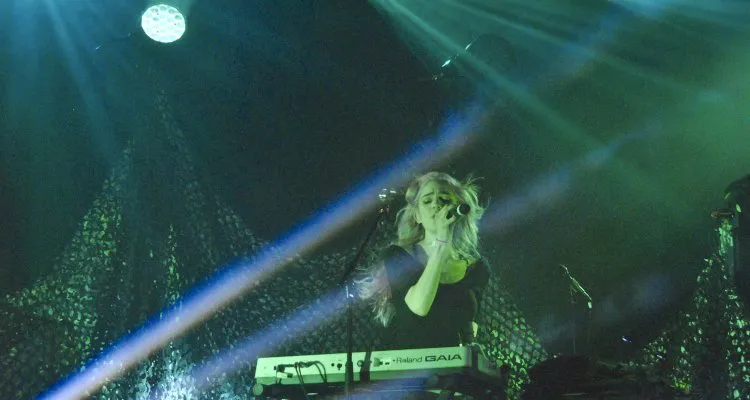Grimes performing live. Photo Credit: Jordan Uhl
Amid continued fan interest in “Heart on My Sleeve,” the unauthorized artificial-intelligence track made to sound like a Drake release, Grimes has offered to split the royalties attributable to any AI-generated track featuring her voice.
35-year-old Grimes (real name Claire Boucher) just recently took to social media to make the offer and outline its logistical framework, publishing tweets on the subject and then posting to Instagram for good measure. Despite being pulled from Spotify, Apple Music, and other services, the aforementioned “Heart on My Sleeve” is still circulating on platforms including YouTube, where one six-day-old upload has about 130,000 views and counting.
Of course, more than a few other accounts have also uploaded (and reuploaded) the roughly two-minute work – on top of different AI Drake tracks yet as well as Rihanna, Michael Jackson, Travis Scott, and Ariana Grande soundalike songs.
And with a growing number of fans still interested in these releases, which are garnering millions upon millions of cumulative plays, Grimes has moved to strike a deal with the parties behind “any successful AI generated song that uses my voice.”
“I’ll split 50% royalties on any successful AI generated song that uses my voice,” penned the Vancouver native Grimes. “Same deal as I would with any artist i collab with. Feel free to use my voice without penalty. I have no label and no legal bindings.
“I think it’s cool to be fused w a machine and I like the idea of open sourcing all art and killing copyright,” continued the Alter Ego judge Grimes, who has in the past spoken about her rocky relationship with Beggars Group’s 4AD.
Subsequently, the “Oblivion” artist took things a step further by signaling that her team is officially developing a program that would set the stage for the creation of authorized Grimes AI music.
“We’re making a program that should simulate my voice well but we could also upload stems and samples for ppl to train their own,” penned Grimes, indicating thereafter that participants will be able to register to receive their royalties “using smart contracts.”
Hours after the latter post went live, in a testament to the numerous organizational considerations associated with the unprecedented situation, Grimes this afternoon highlighted certain types of content that would prompt the takedown of the AI-voice tracks. “Ok hate this part but we may do copyright takedowns ONLY for rly rly toxic lyrics w grimes voice: imo you’d rly have to push it for me to wanna take smthn down but I guess plz don’t be *the worst*,” she specified at the start of a lengthy tweet.
Needless to say, far-reaching questions remain about artificial intelligence’s role in music as well as Grimes’ comments and offer. Front of mind are inquiries pertaining to the sheer volume of releases that the arrangement seems poised to produce, besides the impact on different acts’ followings, prior Grimes projects, and more.
But one would believe that parties on the AI side of the deal will find the proposed royalty split far more appealing than a zero percent share, which other acts and companies are in effect pushing by tearing down computer-generated soundalike music.

